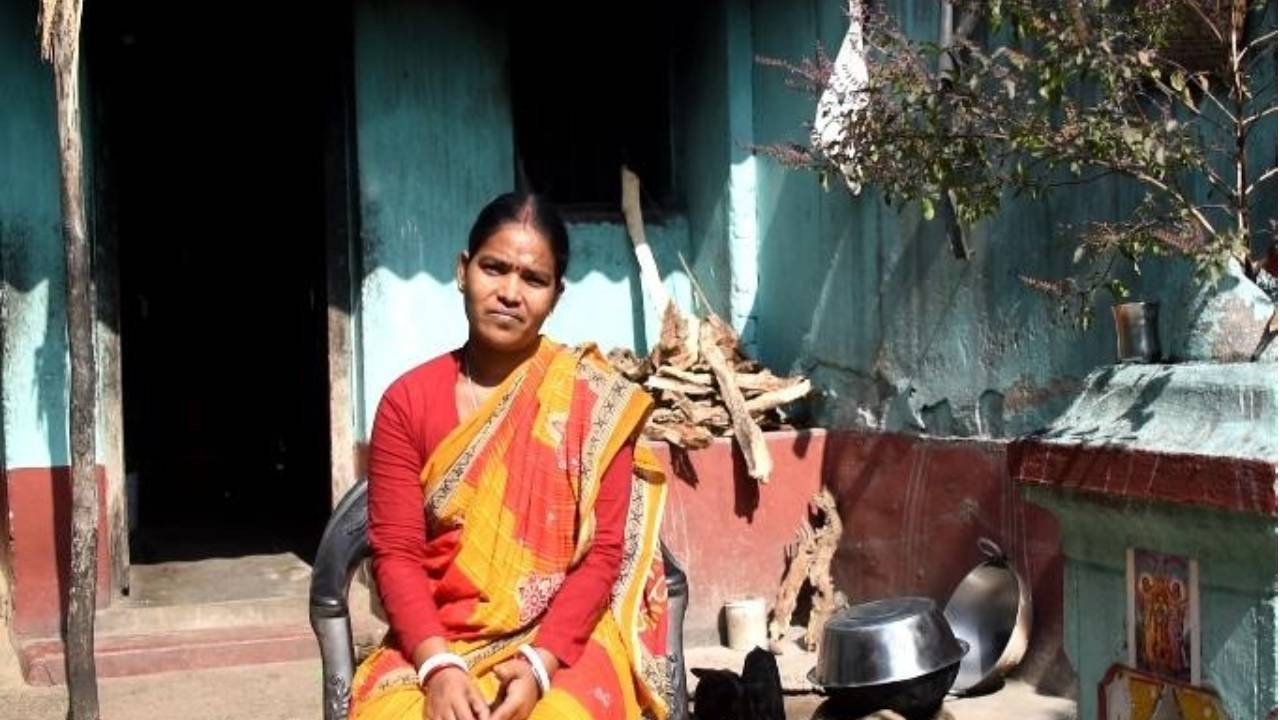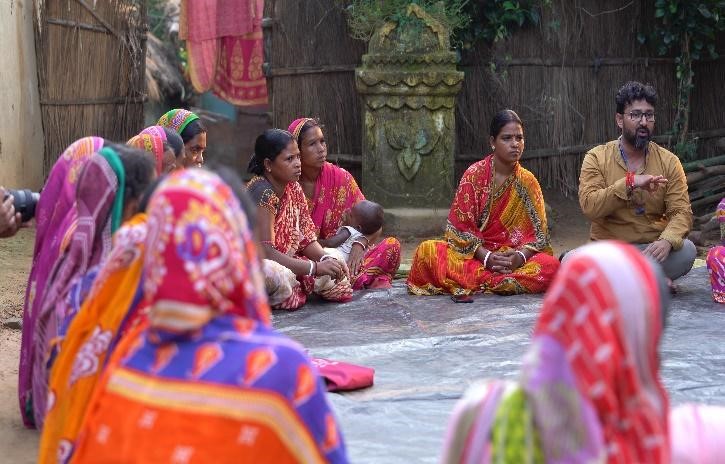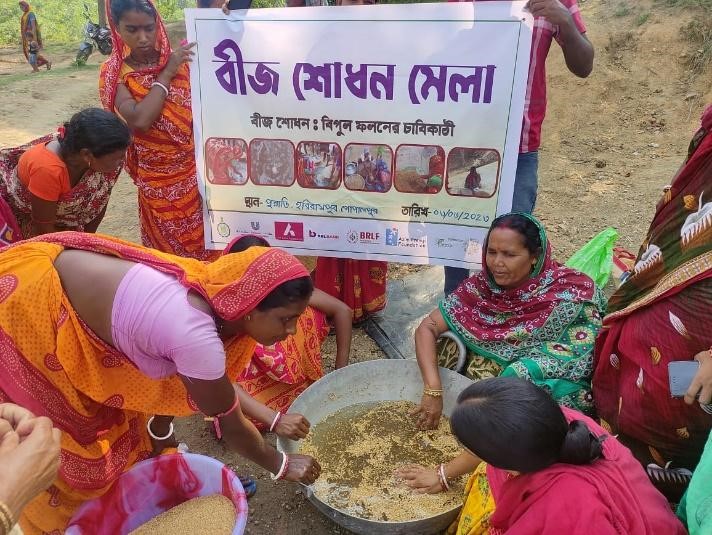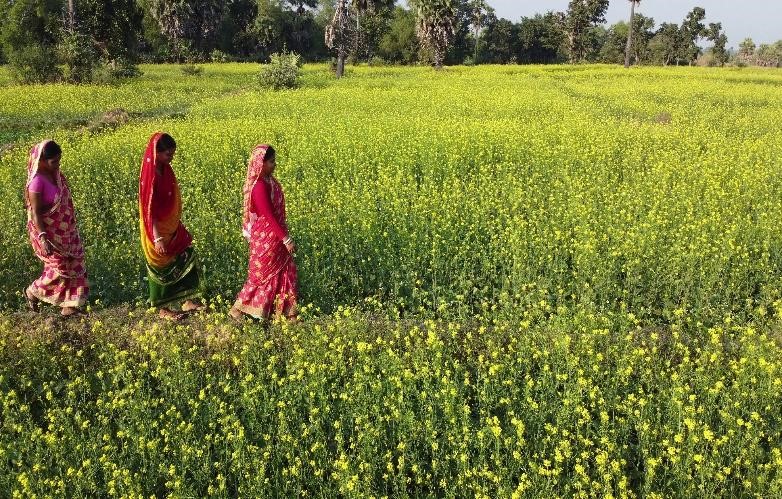Tapasi’s Triumph: A Tale of Transformation
– Pritom Das and Abir Ul Islam, Bankura, West Bengal
Remote Harirampur:
Stuck in the confines of her home, Tapasi Gope from Harirampur village in West Bengal once led a life established with the rhythms of domesticity. Yet, life had other plans for her, that would reshape not just her and her family’s existence but also influence the life of hundreds of people living in her community.

Fig. Tapasi Gope in her home
The Inner Calling:
The village of Harirampur was struggling with the lack of water bodies for agricultural purposes leading to the use of a decreased amount of land for cultivation activities. The poor resources were also taking a toll on the family of Tapasi and Prabhas Gope. Unsure about what to do, Tapasi Gope was grappling with the wish of wanting to do something for her family but lacking the resources and knowledge to improve agricultural practices to improve the financial comforts of her family.
Once a shy and reserved homemaker, Tapasi’s world took a shift when she ventured beyond the familiar walls of her home to attend training sessions on Integrated Natural Resource Management and climate-sensitive agriculture organised by PRADAN, three years ago. Intrigued, interested, and impressed by these sessions, Tapasi wished to learn more about improved and innovative farming practices. She resolved to use these techniques and bring a positive change for her family as well as her community.
Confronting Adversity:
Full of doubts but determined, she embarked on a quest to improve farming practices on her family’s land. Earlier, the community including Tapasi’s family was dependent on just the Kharif crops for sustenance due to lack of water availability, but now she wished to improve both crop diversity and agricultural intensity with the help of INRM and regenerative agricultural practices.
However, it wasn’t going to be easy; her path was laid with thorns of resistance. Despite her spouse, Prabhas Gope’s support, her in-laws rebuffed her efforts, their skepticism casting shadows on her aspirations. Undeterred, Tapasi sought solace in her Self-Help Group meetings, hoping to inspire fellow women there. Yet, the harsh reality of patriarchal norms and the lack of women’s abilities to influence farming decisions within their households were discouraging. Tapasi found herself at a crossroads.
What would the community do? With a meager earning around Rs, 50,000/year per family on an average land holding of 0.6 acre didn’t provide them with much room to experiment. They were scared of taking a chance and losing out on that little income that they were earning!

Photo: Tapasi Gope in a meeting with fellow farmers
The Road Less Traveled:
Despite the initial setbacks, Tapasi decided to relentlessly raise demands for sensitization workshops on Integrated Natural Resource Management (INRM) and regenerative agriculture in her village. She rallied PRADAN professionals and local officials to her cause, determined to bring positive changes in agriculture and livelihoods in her community.
The Dawn of Change:
Over time, Tapasi’s struggle gained momentum. As luck would have it, the initiation of START (Stimulating Tribal and Rural Transformation) project under RBL Bank Ltd. in her village provided her with the much-needed support to execute the improved farming practices on ground. A Producer Group, ‘Dangamati Utpadankari Samity’ was set up under the project. Later Dalmadal FPC was also created under the project to support the villagers in their endeavors.
Today, this FPC boasts a membership of 58 shareholders. The process of input linkages (availability of seeds, pest management, etc.), following up with PoP (Package of Practices) after sowing of seeds and providing market linkages, every small and big component of farming is supported by Tapasi and the FPC. This end-to-end support is popularly called ‘beej se bazaar tak’ (from seeds to market)!
Tapasi Gope, supported by PRADAN, and the FPC encouraged the farmers to cultivate indigenous rice varieties like Bhutmuri, Danaguri, Kerala Sundari, and Kala Champa. They embraced the use of organic inputs and regenerative agricultural techniques, a move that garnered widespread approval due to the substantial reduction in cultivation costs up to Rs. 3,000 per acre costing Rs, 5,000 per acre as compared to Rs. 8,000 per acre, earlier. Even in the situation of below-average rainfall, these selected rice varieties exhibited remarkable resilience, resulting in an average yield of 15-17 quintals per acre as compared to 10-12 quintals per acre earlier; consistent with typical productivity in years with regular rainfall.

Photo: Tapsi Gope with other SHG members st a Seed Treatment Mela for disease-free seedling
Growing in diversity: Innovation and Success
The optimistic wave faced a significant challenge in the Kharif season of 2023-24 when rainfall hit an alarming low. A considerable portion of Paddy perished at the nursery stage before transplantation, posing a threat to the newfound agricultural prosperity.
“প্রথমে খুব ভয় করছিলো – বুঝতে পারছিলামনা কি করা উচিত। গ্রামের সবাই আমার কাছেই সাহায্য চাইছিলো। অনেক ভাবনা চিন্তা করে তবে ঠিক করলাম যে একদম সরকারের কাছেই সাহায্য চাইবো।” (I got a bit scared initially, I didn’t know what to do. Everybody in the village was coming to me for help and I didn’t have any solution for them. After a lot of deliberation, I decided to take help from the government/public system), says Tapasi Gope reminiscing the old days.
Collaborating with a group of farmers, she engaged with the Assistant Director of Agriculture (ADA) in Hirbandh block. The ADA suggested a shift to early mustard cultivation given the already prepared land and available rainfall. The PG, FPC, led by Tapasi, embraced this suggestion, planning for 52 acres of early mustard cultivation along with 61 farmers from the village.
Cultivating a continuous 52-acre stretch of early mustard, once considered an ambitious undertaking, became a reality through meticulous planning and the commitment of all involved parties. Winter rainfalls further eased anxieties related to the scale of the project, and the mustard plants began to fruit.

Photo: Cultivated mustard field
Impressed by the proactivity and dedication of the farmers in Harirampur, the ADA further allocated funds to the Producer Group to experiment with 12 varieties of mustard for early sowing. This marked a recognition of the community’s ability to adapt to challenges and innovate in the face of adversity!
In terms of monetary benefits, these interventions have yielded significant savings and income boosts. Specifically, the advancements in regenerative agriculture have decreased input cost and resulted in an average savings of Rs. 4,600 per acre for farmers. Moreover, by optimizing land utilization and expanding coverage, farmers in Harirampur have accrued additional earnings ranging from Rs. 10,000 to Rs. 26,000 per season.
A Legacy of Empowerment:
“আগে আমি আমার বাড়ির দেয়ালের মধ্যে সীমাবদ্ধ ছিলাম, ঘরের কাজে মনোনিবেশ করেছিলাম। তবে, এখন আমি বাইরের কাজে নিযুক্ত হয়ে আছি এবং আত্মবিশ্বাসে অন্যদের সঙ্গে অবস্থান করছি। আমি সবার সাথে হরিরামপুর গ্রামের উন্নতির জন্য কাজ করছি” (Previously, I was confined within the walls of my home, engrossed in household chores. However, now I am engaged in external work and confidently interact with others. I am working with everyone for the betterment of Harirampur village) says a proud Tapasi while looking at her in-laws who are in awe of her now!
“শুরুতে আমরা তাপসীর কাজের উপর বিশ্বাস করতাম না, তার কাজ নিয়েও সন্দেহ করতাম। তার কাজের ফলে ক্ষতি হতে পারে এই নিয়েও দুঃচিন্তা এখন আমরা তার কাজ দেখে গর্বিত হয়” (At first, we doubted Tapasi’s ability to follow through on her aspirations. We were also apprehensive about the potential for losses. However, witnessing her achievements now fills our hearts with pride), says a visibly proud Jyotsana Gope, mother-in-law of Tapasi.
Tapasi Gope’s journey transcends the realms of personal triumph, leaving a mark on Harirampur’s history. Her commitment to improved agricultural practices, enhanced income, and a better lifestyle has not only transformed the landscape of her village but also breathed new life into the aspirations of its residents.

